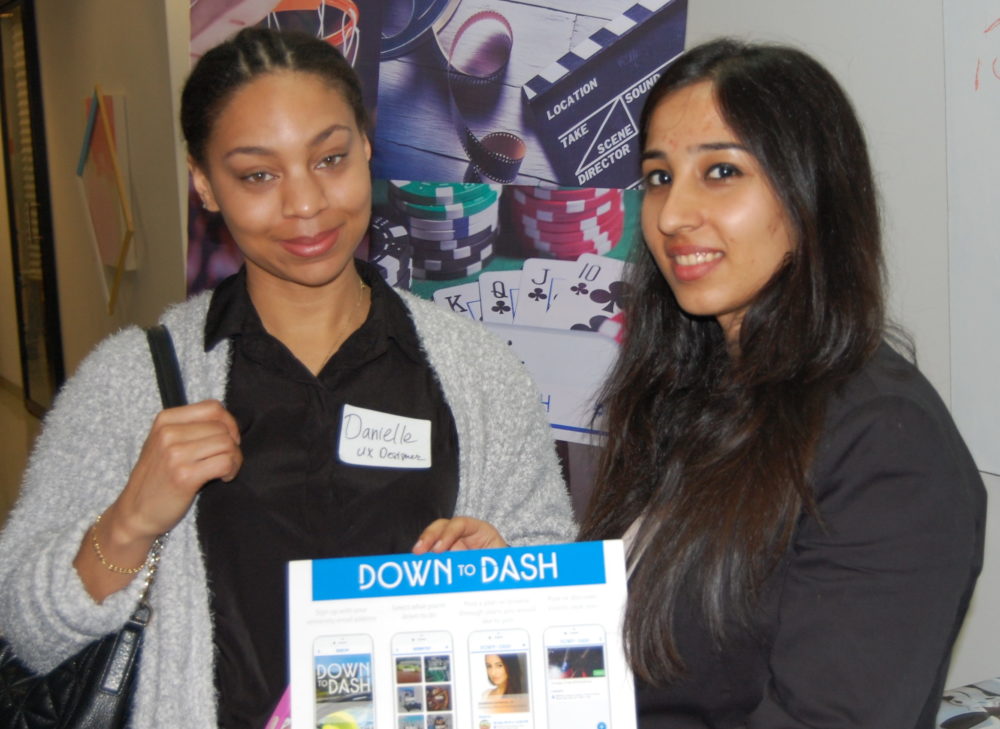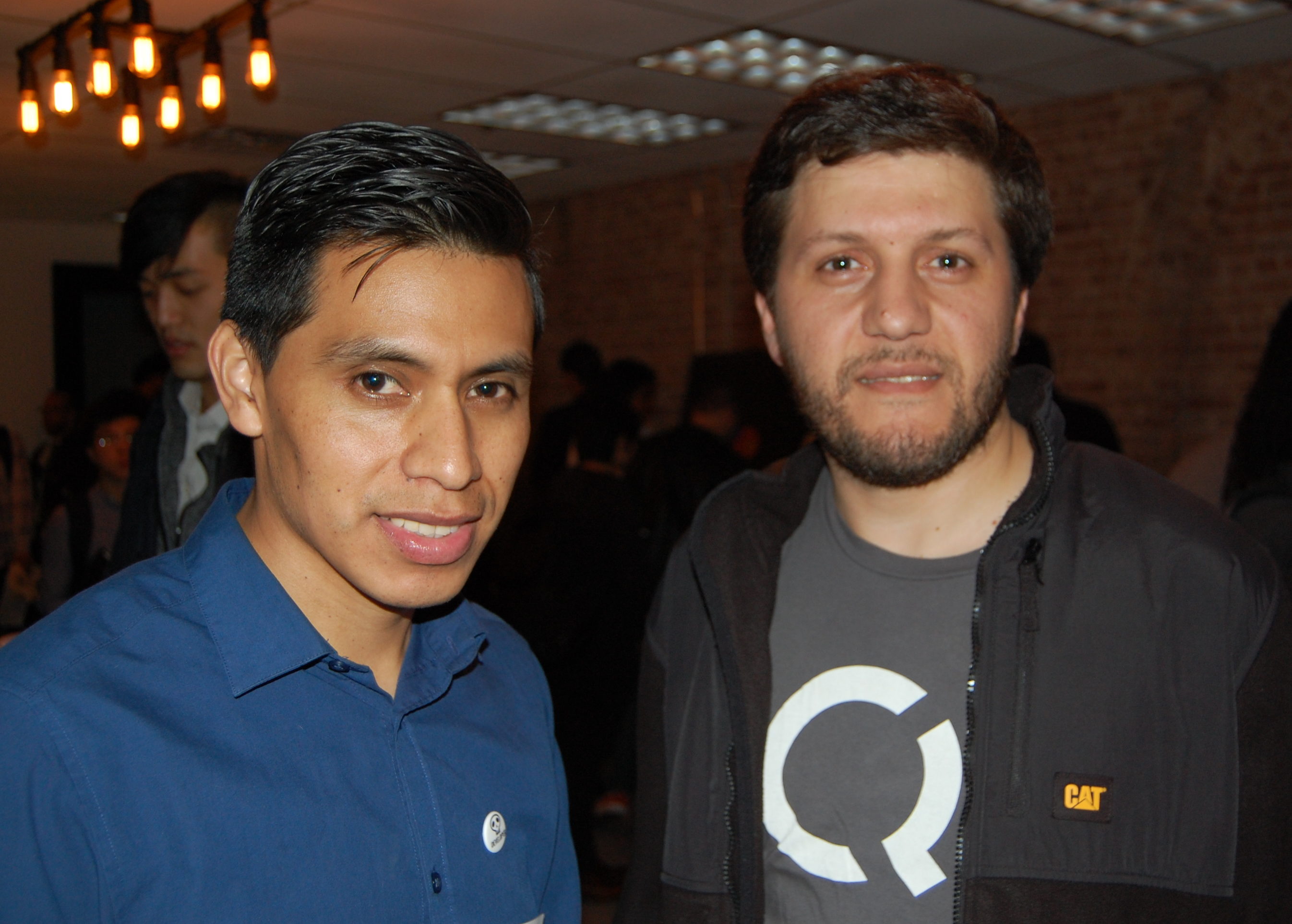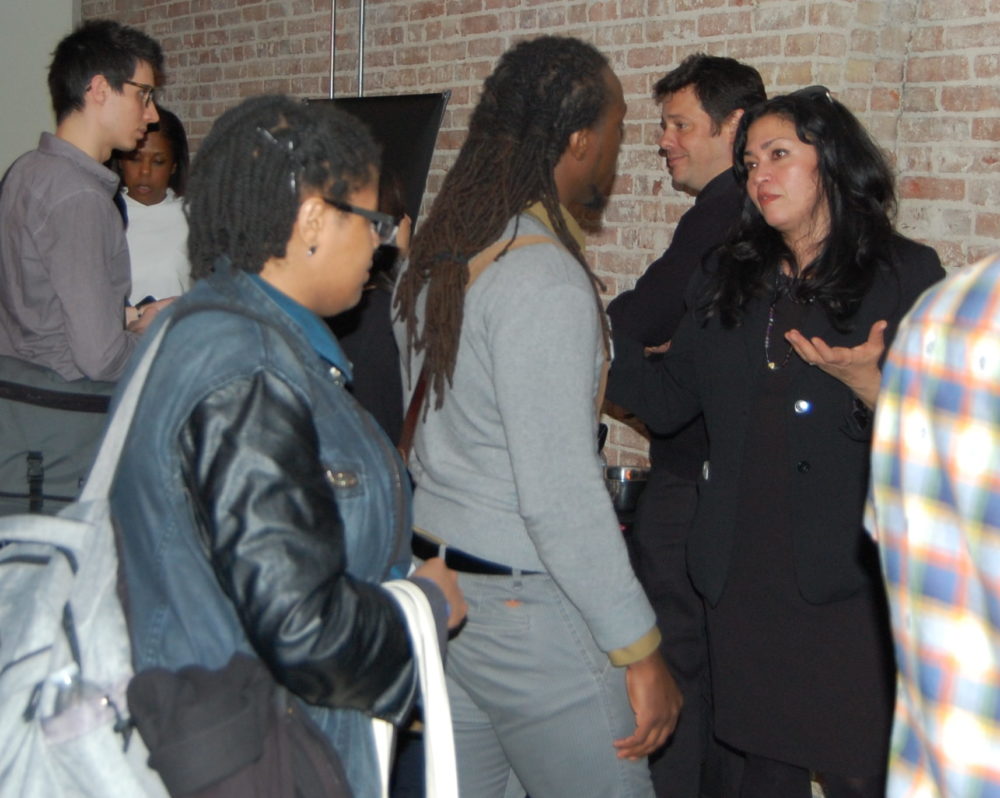What I Saw at the Job Fair: Better Get Your Tech On
In Downtown Brooklyn, eager recruiters hunted for technologists–and those who want to be one
Sama Jashnani, at right, co-founder of Down to Dash, explained her startup company to a job seeker at the fair (Photos by Steve Koepp)
As job-seeker Shantel Moore waited in line to speak with a recruiter for JPMorgan Chase last night at a Downtown Brooklyn job fair, she represented a potential second-generation employee at the bank. Her father is retired from Chase, and she’d like to become a web developer for the company. “They’ve been good to my family and I have experience in finance” as well as fresh training, she said. Moore, 31, had just completed a 17-week immersive course in web development at General Assembly, the tech-education firm, so she felt confident about her chances.

Luis Carbajal, left, and Iliass Sabillah, who both recently graduated from an IT training program at Coalitions for Queens, were looking for developer jobs
She is probably justified. Technologists are in high demand, increasingly so in Brooklyn. Meeting applicants at the head of the line was Kimberly Polony, a Chase vice president who recruits tech prospects. She said the company currently employs 1,700 technologists at its Metrotech Center hub and wants to hire 300 more in the near future. But Chase has many rivals for those recruits. “It’s very competitive. That’s why we’re here,” she told The Bridge. Overall, Chase has more than 44,000 technologists at 13 hubs around the world.
The job fair, called NET/WORK Brooklyn 2017, was the first of its kind hosted by Technical.ly Brooklyn, the local division of the media chain headquartered in Philadelphia. “Not your average job fair,” observed Zack Seward, Technical.ly’s editor in chief, as he stood among video games, robotic demonstrations and free snacks. “It’s supposed to be fun. The idea is that local journalism is moving into the service space,” making connections between readers, companies and job seekers. A happy hour was scheduled to wrap up the event.
At the NET/WORK fair, hosted at CoLab-Factory on Dekalb Avenue, 14 companies recruited among about 150 job seekers. Many of those were recent graduates of tech-training academies in the city. Iliass Sabillah, 32, of Bayside, Queens, was looking for a junior coding position. His friend Luis Carbajal, 28, of Manhattan, had been trained as a full-stack developer (a generalist) but wants to move into a specialized role as a front-end expert. “If they know you can do everything, they make you do everything,” he said. Both had just graduated from a 10-month coding program run by the Coalition for Queens in Long Island City.

Sonia Hernandez, a senior recruiter for JPMorgan Chase, talks with job-seekers at last night’s job fair in Downtown Brooklyn
Not all the jobs were purely tech-oriented. Sama Jashnani, co-founder of Down to Dash, a network that helps college students organize their activities, was recruiting prospects trained in social media, marketing and public relations. The applicants she meets tend to be quite savvy in the kinds of media they’ll be dealing with, Jashnani said. “Two out of three, I can see actually working for us. This culture gets the app and believes in it.”
Technology Is Pervasive
Yet technology can now be found at the heart of nearly every field. Cox Automotive, based in Lake Success, NY, was posting a job for a software engineer to work on Dealertrack, a software platform for auto dealers. Brooklyn Robot Foundry, a rapidly growing educational firm with locations in Brooklyn and Manhattan, is looking for assistant teachers for their classes on how to build your own robots and gadgets.
For job seekers whose skills don’t yet match what the recruiters want, several training programs were on hand to tout their classes. Dev Bootcamp offers immersive software-development programs at campuses in six U.S. cities, including New York. Nicole Drummond, a career development coach with the company, says her role is to make sure graduates find employment. One strategy is to persuade companies to offer apprenticeships, which typically provide workers with a longer commitment and better pay than internships do.

Representatives of Honeygrow distributed free samples. The restaurant company offers create-it-yourself meals based on locally grown ingredients; it just opened a location on Joralemon Street in Downtown Brooklyn
Mark Wiltshire, a community-engagement associate, was at the fair representing Per Scholas, an IT-training nonprofit that was launched in 1995 in the South Bronx to close the digital divide and now has offices in Brooklyn, Atlanta, Dallas and other cities. Per Scholas accepts recruits with no tech experience who are 18 and over with a high-school equivalent degree. The job-placement rate is 80%, Wiltshire said, and the program’s website says the typical student’s income jumps from $7,000 before training to $30,000 or more after they graduate.













